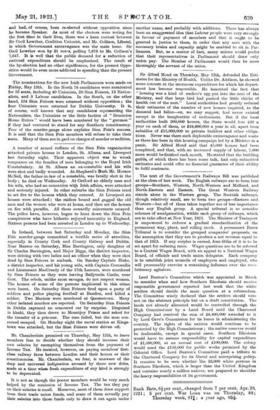The text of the Government's Railways Bill was published at
the close of last week. The English railways are to form four groups—Southern, Western, North-Western and Midland, and North-Eastern and Eastern.. The Great Western Railway stands alone in the Western group. The Scottish railways, though relatively small, are to form two groups—Eastern and Western—but all of them taken together are of lees importance than any English group. A special tribunal is to consider schemes of amalgamation, within each group of railways, which are to take effect at New Year, 1923. The Minister of Transport is empowered to enforce a gradual standardization of the permanent way, plant, and rolling stock. A permanent Rates Tribunal is to consider the grouped companies' proposals, on the assumption that they are to produce a net revenue equal to that of 1913. If any surplus is earned, four-fifths of it is to be set apart for reducing rates. Wages questions are to be referred to a Central Wages Board, with an appeal to a National Wages Board, of officials and trade union delegates. Each company is to establish joint councils of employers and employed, who will presumably exercise a restraining influence over the revo- lutionary agitators.


































 Previous page
Previous page